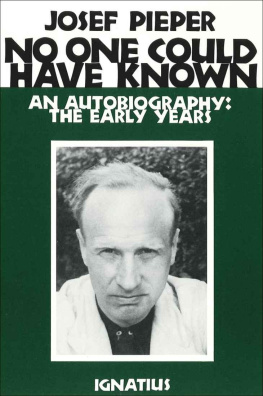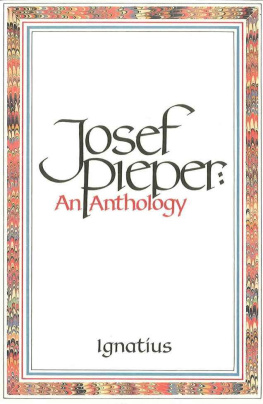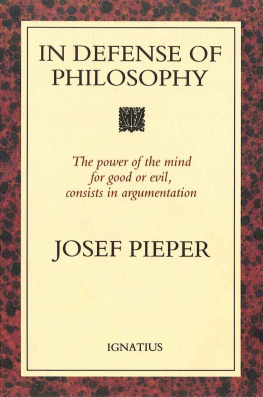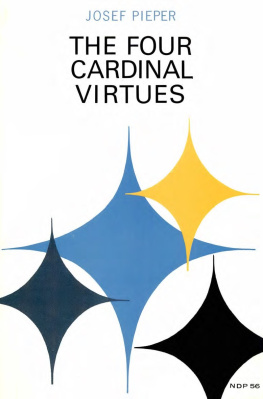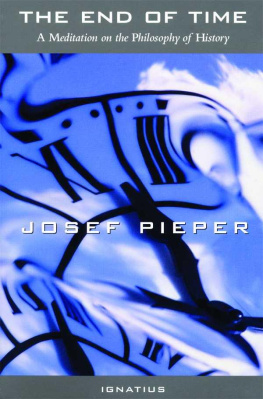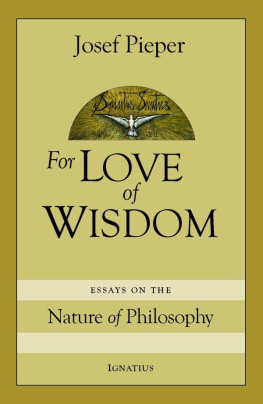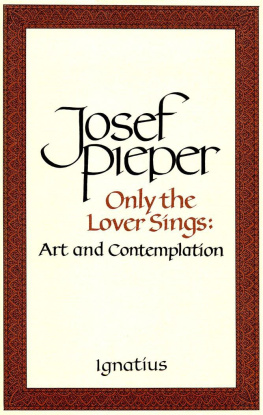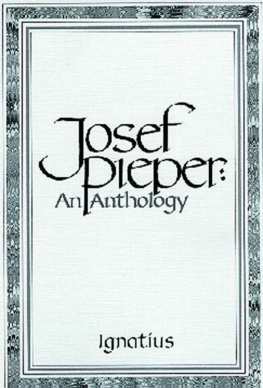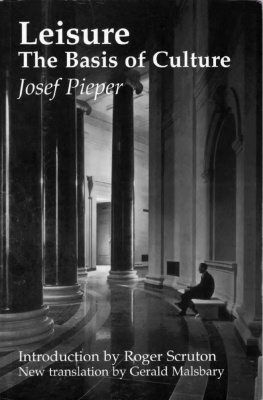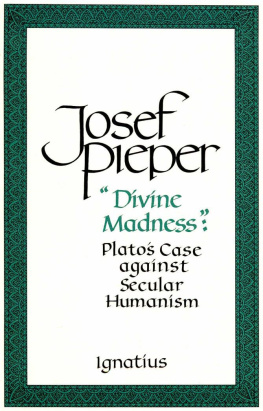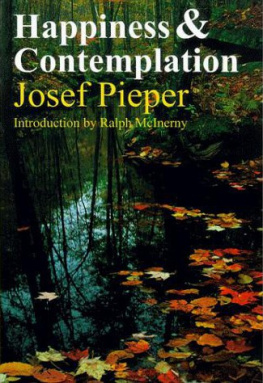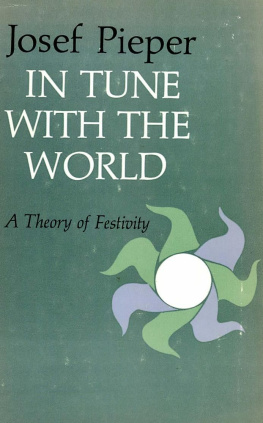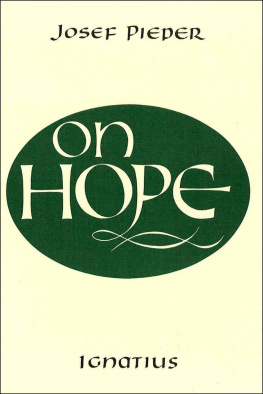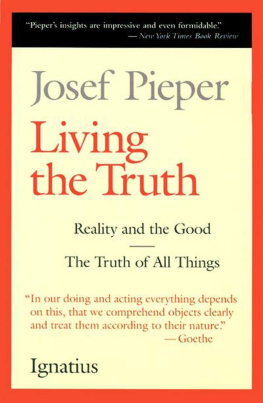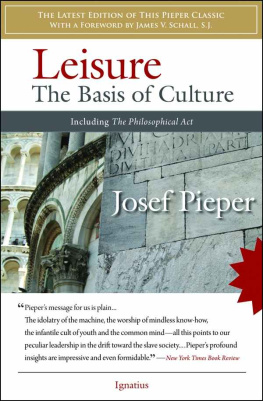Josef Pieper - Brief Reader on the Virtues of the Human Heart
Here you can read online Josef Pieper - Brief Reader on the Virtues of the Human Heart full text of the book (entire story) in english for free. Download pdf and epub, get meaning, cover and reviews about this ebook. year: 1991, publisher: Ignatius Press, genre: Science. Description of the work, (preface) as well as reviews are available. Best literature library LitArk.com created for fans of good reading and offers a wide selection of genres:
Romance novel
Science fiction
Adventure
Detective
Science
History
Home and family
Prose
Art
Politics
Computer
Non-fiction
Religion
Business
Children
Humor
Choose a favorite category and find really read worthwhile books. Enjoy immersion in the world of imagination, feel the emotions of the characters or learn something new for yourself, make an fascinating discovery.
- Book:Brief Reader on the Virtues of the Human Heart
- Author:
- Publisher:Ignatius Press
- Genre:
- Year:1991
- Rating:4 / 5
- Favourites:Add to favourites
- Your mark:
- 80
- 1
- 2
- 3
- 4
- 5
Brief Reader on the Virtues of the Human Heart: summary, description and annotation
We offer to read an annotation, description, summary or preface (depends on what the author of the book "Brief Reader on the Virtues of the Human Heart" wrote himself). If you haven't found the necessary information about the book — write in the comments, we will try to find it.
Brief Reader on the Virtues of the Human Heart — read online for free the complete book (whole text) full work
Below is the text of the book, divided by pages. System saving the place of the last page read, allows you to conveniently read the book "Brief Reader on the Virtues of the Human Heart" online for free, without having to search again every time where you left off. Put a bookmark, and you can go to the page where you finished reading at any time.
Font size:
Interval:
Bookmark:
A Brief Reader on the Virtues of the Human Heart
Josef Pieper
Translated by
Paul C. Duggan
IGNATIUS PRESS SAN FRANCISCO
Originally published in German as
Kleines Lesebuch
von den Tugenden des menschlichen Herzens
1988 Schwabenverlag AG
Ostfildern bei Stuttgart
Cover design by Roxanne Mei Lum
Cover border by Pamela Kennedy
Calligraphy by Victoria Hoke Lane
With ecclesiastical approval
1991 Ignatius Press, San Francisco
All rights reserved
ISBN 0-89870-303-4
Library of Congress Catalogue number 90-81767
Printed in the United States of America "Josef Pieper's account of the centrality and meaning of the virtues is a needed primer to teach us exactly the meaning and relationship of the virtues and how they relate to the faith and its own special virtues. Pieper's attention is ever to the particular virtue, its precise meaning, and to its contribution to the wholeness that constituted an ordered, active, and truthful human life. No better brief account of the virtues can be found. Pieper has long instructed us in these realities that need to be made operative in each life as it touches all else 'that is', as Pieper himself often puts it." James V. Schall, S.J. Georgetown University "A fine and thought provoking examination of the relationship between the mind, heart, and moral life of the human person." John Cardinal O'Connor Archbishop of New York "Pieper's sentences are admirably constructed and his ideas are expressed with maximum clarity. He restores to philosophy what common sense obstinately tells us ought to be found there: wisdom and insight." T. S. EliotA RETROSPECTIVE PREFACE
In Reinhold Schneider's elegiac autobiography (Verhllter Tag [The veiled day]) there is a chapter with the heading "Colmar". It begins with his complaint that as a writer he no longer had "any legal prospects" in Germany. The publishing house Insel-Verlag had just informed him that then in 1941 only "books necessary and important for the war effort" were permitted. As it turned out, an unexpected new opportunity emerged in the Alsatia-Verlag in Colmar. Inevitably he came to speak with the director of that publishing house, "a man laden with troubles". "Just as the accent on his name, Rosse or Ross, shifted back and forth, so did his political situation shift.... Joseph Ross could be a hero tomorrow and a traitor again the day after tomorrow." There then follows a brief account of the three-time incarceration of this man. The first one, even before the war, overtook him as a provocatively resolute Alsatian. From his second imprisonment, imposed upon him for the same reasons as the first while war broke out, he was liberated by German troops. Finally, he was sentenced as a collaborateur to fifteen years' hard labor in a penitentiary in the Pyrenees; he did not survive that confinement. Reinhold Schneider, his author, who in the meantime became his friend, says that "amid bitter suffering and anxiety, but consoled by God, he died as one of the elect". It so happened that this man, Joseph Ross, about whose fate I first learned something during the fifties from Reinhold Schneider's book, was the director of the same publishing house for which I became an author at the same time in 1941; this occurred through the almost chance mediation of a friend, without my being at all aware of the connections. For myself as well, at that time there was no more opportunity for my activity as a writer. In the index of my works that was published in 1974, for the time between 1940 and 1948 only two books are listed, and both of them were brought into print by that same publisher in Colmar. To be sure, only one of them was "published", namely, this newly issued Brief Reader from 1941. The other book, Wahrheit der Dinge, was indeed printed, in an edition of ten thousand copies. Not one of them, however, appeared in public light, since the entire lot burned up amid the storms of war that advanced on Colmar in 1944. This misfortune proved later to harbor an unexpected stroke of luck: in 1945, as I returned from confinement as a prisoner of war, I thereby had available an "as yet unpublished" Habilitationsschrift (postdoctoral thesis) to submit to the University of Mnster. However, that is a new and different story about which no more will be said here. Nevertheless, it is to be remarked that here in Germany at that time one hardly knew anything about the factual conditions and still less about the unusually dramatic and plainly tragic circumstances under which the operations of the Alsatia-Verlag were conducted. On the contrary, it was said that the National Socialist regime favored the German-Alsatian publisher with these exceptional and, for us, surprising allocations of paper out of purely political calculation. In reality, things were very different. Indeed, the director of the firm was awarded some party honors that to him were most undesirable. The paper allocations, however, were the work of an influential friend in Berlin, who, despite the category of "strictly illegal", did the right thing with the utmost daring. And in the Colmar publishing house one carried on in constant expectation of a shutdown by the Nazi regime, particularly because of the persistently exclusive production of plainly Christian religious literature. There is still a third coworker to be mentioned, one who labored in secret in the "Church war aid": he saw to it that all these "undesirable" writings, as had been already done earlier with the brief edition of the "Christian Primer", were provided with the official stamp of the "responsible" political offices and placed on the list of officially permitted literature for mass distribution on the front lines.It is, then, the purpose of this retrospective to place a modest monument to this concealed and unselfish yet, to put it mildly, still unthanked deed.
J. P.
A Brief Reader on the Virtues of the Human Heart
Virtue is the utmost of what a man can be; it is the realization of the human capacity for being.
The primal will for the good lives from the ongoing momentum of the original leap by which man, in answer to the creative call of God, crossed over the chasm that divides nothingness from existence. This is the momentum with which the possible rushes forth into the radiant early morning of its first realization: the flow of a stream that has its source in the bright darkness of the natural and, ever nourished by its origin, attains the brink of the realm of freedom under the judgment of the primal conscience.
The luminous domain of free human action, governed by knowledge, is ringed on all sides by the darkness, the darkness of the natural in us and the deeper impenetrable darkness of the immediately divine rule of our desire and action. Yet both areas are dark only to us. In reality, they are irradiated by the unending brightness of divine knowledge and foresight. Concerning this brightness, Sacred Scripture says that its "light" is "inaccessible" (1 Tim 6:16); according to Aristotle, our understanding relates to it "as the eyes of nocturnal birds to the light of day".
The strain of self-mastery, which for us countrymen of Kant is inseparable from any concept of upbringing and moderation and is generally tied to and fused with the concept of virtue, is an accompanying phenomenon only of less perfect and beginner stages, whereas authentic, perfected virtue, by dint of the very definition of the concept, bears the happily radiant seal of spontaneity, of freedom from constraint and of self-evident inclination. Thomas Aquinas, the great teacher of Western Christianity, endeavored to express the Christian image of man in seven theses, which can be summarized in the following manner: First: the Christian is one who, in faith , becomes aware of the reality of the triune God. Second: the Christian strives, in hope, for the total fulfillment of his being in eternal life. Third: the Christian directs himself, in the divine virtue of love, to an affirmation of God and neighbor that surpasses the power of any natural love. Fourth: the Christian is prudent ; namely, he does not allow his view on reality to be controlled by the Yes or No of his will, but rather he makes this Yes or No of the will dependent upon the truth of real things. Fifth: the Christian is just; that is, he is able to live "with the other" in truth; he sees himself as a member among members of the Church, of the people, and of any community. Sixth: the Christian is brave, that is, he is prepared to suffer injury and, if need be, death for the truth and for the realization of justice. Seventh: the Christian is temperate; namely, he does not permit his desire to possess and his desire for pleasure to become destructive and inimical to his being. All duty is based upon being. Reality is the basis of ethics. Goodness is the standard of reality. Whoever wants to know and do the good must direct his gaze toward the objective world of being, not toward his own "sentiment" or toward arbitrarily established "ideals" and "models". He must look away from his own deed and look upon reality. The "soundness" of justice, of fortitude, of temperance, of fear of the Lord and of virtue in general lies in the fact that they are appropriate to objective reality, both natural and supernatural. Conformity to reality is the principle of both soundness and goodness. The precedence of prudence indicates that the realization of goodness presumes knowledge of reality. Whatever is good is ascertained by prudence; in turn, whatever is prudent is established by the "thing itself'. Reality, grasped in knowledge, is not only the first given from which the freely desiring outreach of man into the world takes its beginning: at the same time it is also the last point of appeal for the retrospective justification of this outreach inside a person. To the mind of contemporary man, the concept of goodness is excluded rather than included in the concept of prudence. For him there is no good deed that cannot be imprudent or evil deed that cannot be prudent: rather often he will judge lying and cowardice to be prudent but truthfulness and brave self-denial just as often to be imprudent. In contrast, the classical and Christian doctrine of living states that man is prudent and good only together; prudence belongs to the definition of the good. There is no justice or fortitude that can contradict the virtue of prudence; anyone who is unjust is also imprudent through and through. Omnis virtus moralis debet esse prudens: all virtue is necessarily prudent. Only someone who is silent is listening. And only the invisible is transparent. To be sure, a deeper silence than mere abstention from speech and utterance is required. There is also interior speech which must also become mute, so things might find their proper utterance. Thus, one who is truly listening is not "deadening" himself into an unnatural and unintellectual dumbness. His silence is also by no means an empty and dead soundlessness. In this silence there is not only listening but also answering. What the true listener forbids himself is simply this: neither to obscure the radiance of his own eye that gazes on the sun nor to allow the soul's ability to answer (wherein lies its closest correspondence" to the Source of Being) to lapse into words. Thus, the world reveals itself to the silent listener and only to him; the more silently he listens, the more purely is he able to perceive reality. Since reason is nothing else than the power to understand reality, then all reasonable, sensible, sound, clear, and heart-stirring talk stems from listening silence. Thus all discourse requires a foundation in the motherly depth of silence. Otherwise speech is sourceless: it turns into chatter, noise, and deception. We lose our speech not only when we are forced down below the threshold of our being but also when we are raised up above our capacities. The core of human existence, the cultivated field of word and speech, thus borders on the right and on the left with wordlessness: with the muteness of the infant and the muteness of the mystic. Talk, however, sets its roots downward into the nourishing soil of silence. A particular form of nonsilence has always been regarded as a kin of despair: talkativeness, babble, the unquenchable frenzy of idle talk. When, however, talk of this kind, which one encounters truly everywhere in the workplace and the marketplace as a constant temptation, when such deafening talk, literally bent upon thwarting listening, appears to be connected with hopelessness it is to be asked, then, should there not be in silence, in listening silence, necessarily a drop of hope? Who indeed could be attentive in silence to the discourse of things unless he expected something from perceiving the truth? And in a newly established discipline of silence, would there not lie the chance not only of overcoming the sterility of everyday talk but also its kin, hopelessness even if perhaps at first only insofar as we acknowledged the true face of this kinship? I realize that other faculties, applied to human purposes, come into play here; perhaps the circle has to be broken at some other point. Nonetheless, one may ask whether the "quick strict resolution" to keep silence could at the same time be a kind of exercise in hope? Wherever the arts live from the festive contemplation of the world and its foundations, something like a liberation is achieved, a setting forth under the open sky both for the creative artist himself as well as for the simplest onlooker. A man needs this liberation, this presentiment of the final and utmost stillness, almost more than he needs bread, which is indispensable and yet insufficient. Prudence, as the formal basis and "birth mother" of all human virtue, is the cautious and decisive faculty of our spirit for shaping things, which transforms the knowledge of reality into the accomplishment of the good. It encompasses the humility of silent, i.e., unbiased, understanding, memory's faithfulness to being, the art of letting things speak for themselves, the alert composure before the unexpected. Prudence means the hesitant seriousness and, so to speak, the filter of reflection and yet also the daring courage for definitive resolution. It means cleanness, uprightness, openness, and impartiality of the being, elevated above all difficulties and expediencies of the merely "tactical". Prudence, as Paul Claudel says, is the "knowing bow" of our being, as it must be steered through a multiplicity of limitations into perfection. In the virtue of prudence the ring of active life is closed and rounded to its genuine fulfillment: out of the experience of reality the person works toward reality, thus realizing himself in decision and action. This condition manifests its depth in the singular utterance of Thomas Aquinas: in prudence, the dominant virtue of the conduct of our lives, the happiness of active life is resolved. Prudence its that lamp of moral existence of which it is said in one of the wisest books of the East that it is denied to anyone who "regards himself". There is a dark resolution and a bright resolution: prudence is the brightness of the resolution of the one who has decided "to live by the truth" Jn 3:21). The finite spirit is not so deeply understandable to itself or powerful over itself that it can follow only its own light in all things. Nor is it sovereign over objective realities, unlike a field commander with a comprehensive view; rather, it is urged and compelled by its nature to learn the truth about objective realities. However, the path that this urging, separate from any self-determination, follows is illumined by that dim light that completely envelops and surrounds the clear vessel of our self-governing freedom. Nonetheless, it remains true for this sphere of free action that man's good lies in being in accordance with reason. The man who does good follows the lines of an architectural plan that has not been devised by himself or even totally understood by himself in all its components. This plan is revealed to him moment by moment only through a narrow cleft and a tiny gap; in his transient condition, he never perceives the specific plan for himself in its global and definitive form. Concerning conscience, which to an extent is prudence itself, Paul Claudel says that it is the "forbearing lamp that characterizes for us not the future but the immediate". Man's moral deeds are not more or less identifiable handholds as he scales the heights of technical accomplishment but rather are steps in his self-realization. The human self, which grows toward its fulfillment by performing the good, is a "work" that surpasses from the very beginning all human plans and designs. The becoming of the moral person occurs in the individual's appropriate response to reality, which we have not made and whose essence is the shifting forms of becoming and perishing but not permanent being (only God is He Who Is). To know the final goals of one's own life is not and cannot be the fruit of a knowledge to be sought and completed still in this "lifetime". The goals are declared. No one is unaware that one must love and do the good; everyone knows explicitly or not that the distinctive good of man is "to be in accordance with reason", that is, to be in accordance with one's own reality and with reality that one has helped to shape; and there is no one to whom it must still be said that one must be just and courageous and temperate; for all this, no "reflection" is needed. Moral virtue, insofar as it is the basic attitude of voluntary affirmation of the good, is the foundation and precondition of prudence. Yet prudence is the prerequisite for the appropriate realization and effect of this basic attitude here and now. One can be prudent only if one loves and wills the good through and through; indeed, only one who is first prudent can do good. Since, however, the love for good grows over and over through doing, the foundations of prudence are the more deepened and strengthened the more that it is fruitful. There is an amazing and scarcely fathomable depth in this sentence of Thomas Aquinas: false prudence and excessive cleverness are derived from and essentially tied to covetousness. This statement puts the virtue of prudence itself and the basic human attitude operative in it into a sharp new light; it includes the fact that prudence is opposed to covetousness in a most particular way. With one stroke a nexus among several strands of thought is suddenly exposed, thoughts that previously did not seem to be connected. Moreover the German language, with a memory that is no longer distinct, seems to be aware of that secret tie between covetousness and false prudence, a fact that by itself is just as surprising. In Low German the one and the same word wies stands for both the prudent as well as the covetous; and the Middle High German word karg (karc), meaning the clever cunning of selfishness, is considered as falling well within prudence's range of meaning and its "verbal field". "Covetousness" here means more than the disordered love for money and property. Covetousness is to be understood here as the immoderate striving after all "possessions", through which the person thinks he can assure his own greatness and worth. Covetousness thus signifies the anxious senility of a frantic self-preservation bent on only its own assurance and security. Is further explanation needed on how greatly all this is contrary to the innermost direction of prudence; how impossible it is for one to have that silence that knows and recognizes the truth of objective realities; and how impossible it is to have any conformity to reality in knowing and deciding, without the youthfulness of a courageously trusting and, as it were, prodigal renunciation of the conditions of anxious self-preservation and of all selfish "interest" in mere self-confirmation; how simply impossible, then, is the virtue of prudence without the constant readiness for disregarding oneself and without the detachment and tranquility of authentic humility and objectivity? Even the highest supernatural prudence can have no other meaning than this: to allow the more deeply experienced truth of the reality of God and of the world to become the measure and standard for one's own desire and action. Indeed, never can there be a norm for man other than Being itself as well as Truth, whereby Being is revealed; and there can be no higher norm for man than simply God, who simply is, along with his truth. Moreover, concerning the person who "does the truth", it is said in Sacred Scripture that he "comes to the light". The basic attitude of conformity to being, of impartiality, and of objectivity, which is expressed in the classical teaching on prudence, was summarized in the Middle Ages in the marvelously simple sentence, "A man is wise when all things taste to him as they really are. " There is a practical lesson from modern psychology, or rather modern "psychotherapy", that in my opinion can scarcely be taken seriously enough: namely, that a person, to whom things do not taste as they really are but who tastes only himself in all things because he has regard only for himself that such a person not only has lost any real potentiality for justice (and for any moral virtue at all) but also has lost his psychological health indeed, that a whole category of psychological illnesses is based substantially upon this selfish "subjectivity". The prerequisite for justice is truth. Whoever rejects the truth, whether natural or supernatural, is at that point truly "evil" and unrepentant. It happens that precisely the highest of man's natural abilities, namely, the cardinal virtue of prudence, with a view to the supernatural new life's order of being within grace, conceals within itself the most dangerous possibilities of conflict and estrangement. Here the more universal law applies, in virtue of which the highest natural powers, not just the lowest, are capable of the most negative opposition to the divine. Yet of course the contrary is also true: the greatest and most fruitful effects occur precisely and only when the utmost and the supreme power of man's nature willingly submits and weds itself to the transforming core power of the new life. Only when the person's natural power, liberated from all fear of restriction, comes before the face of the Other, will his own depth of being be totally visible. That one man gives to another what belongs to the other is the basis of all just order in the world. In contrast, all injustice means that what belongs to someone is either withheld or taken from him, not indeed by misfortune, bad harvest, fire or earthquake but by man. Since the beloved is not properly "somebody else", justice does not formally exist between lovers. To be just means to acknowledge someone in case one cannot love him. Justice says that there is the other who is not like me but who nevertheless is entitled to what is his. The just person is therefore just in that he confirms the other in his otherness and assists him toward that which belongs to him. That the fundamental act of commutative justice is called "restitution" implies that it is not possible to achieve a definitive ideal condition among men. Rather, it means that the temporary, the nondefinitive and provisional, the repeated mere "improvement" in all historical action belongs to the foundations of man and his world; thus the claim to erect an imperturbable permanent order in the world must necessarily lead to something inhuman. The holder of governmental power can in fact not be compelled to fulfill his duty of justice since by nature he himself is the protector and the agent of distributive justice: "The ruler has his position in order to protect justice." But if the protector of justice does indeed not protect it? Then, dreadfully, injustice takes place! And no appeal to abstract jurisdictions such as "the conscience of humanity", "world public opinion", or "history" can change anything about it. Anyone who thinks through this structural plan of iustitia distributiva from the foundation up has to perceive what governmental rule really is, and that in the human world there is hardly any worse or more hopeless calamity than unjust governmental rule. The just man, the more he realizes that he is the recipient of gifts and that he has an obligation to God and to man, will alone be ready to fulfill what he does not owe. He will decide to give something to the other that no one can force him to give. It is good to be forewarned that the mightiest embodiment of evil in human history, the Antichrist, could indeed appear in the form of a great ascetic. In point of fact, this is the nearly universal lesson of Western historical thought. One who does not grasp the fact and the reason that the worst corruption of the natural man is injustice has to come to ruin through the experiences that call attention to themselves in such visions amid a disorder that can scarcely be overcome. Above all, he would be incapable of recognizing the historical prefigures of that final condition; while he is looking out for the powers of corruption in a mistaken direction, they establish their rule before his eyes. Fortitude presumes vulnerability; without vulnerability there is no possibility of fortitude. An angel cannot be courageous because it is not vulnerable.Next pageFont size:
Interval:
Bookmark:
Similar books «Brief Reader on the Virtues of the Human Heart»
Look at similar books to Brief Reader on the Virtues of the Human Heart. We have selected literature similar in name and meaning in the hope of providing readers with more options to find new, interesting, not yet read works.
Discussion, reviews of the book Brief Reader on the Virtues of the Human Heart and just readers' own opinions. Leave your comments, write what you think about the work, its meaning or the main characters. Specify what exactly you liked and what you didn't like, and why you think so.


